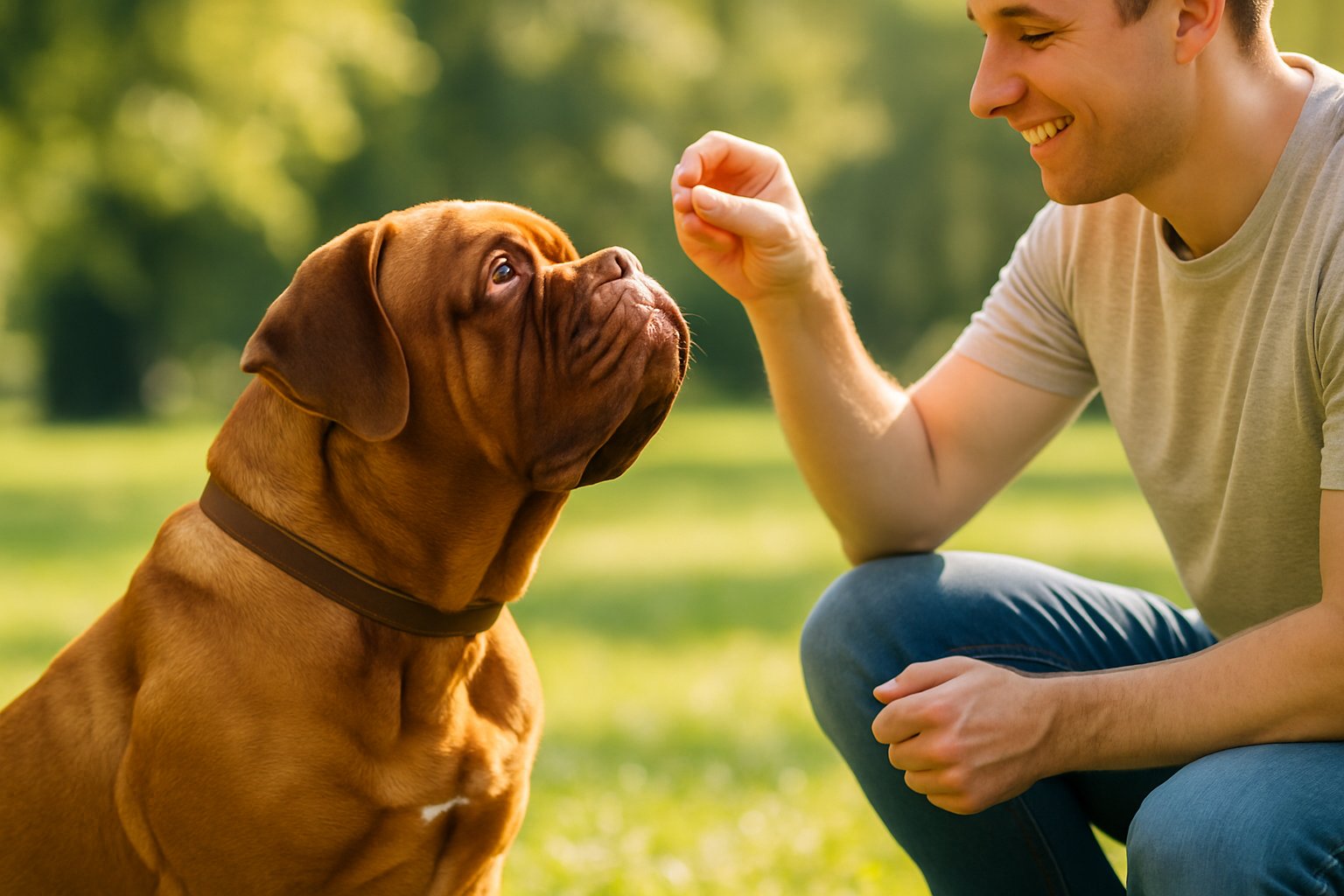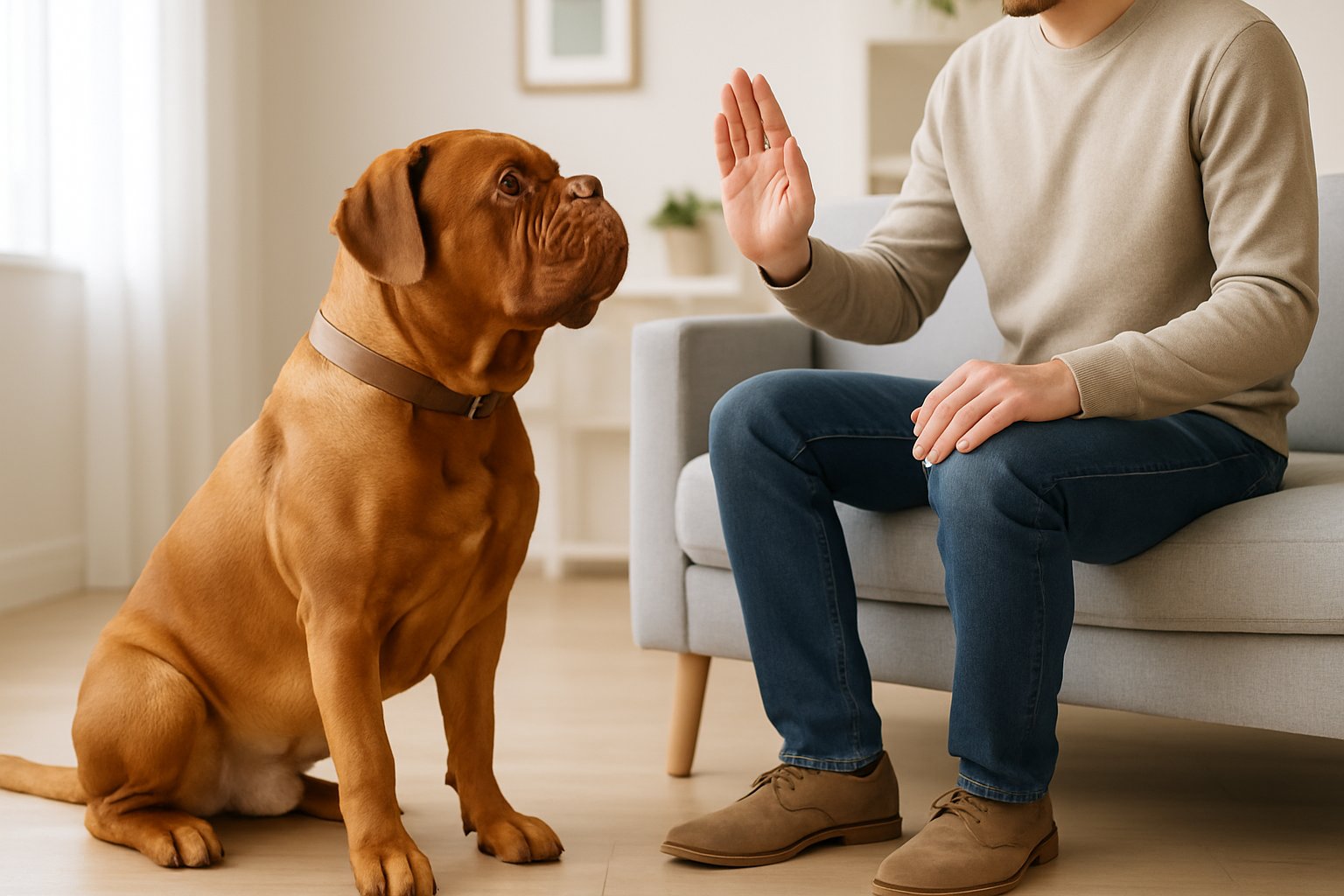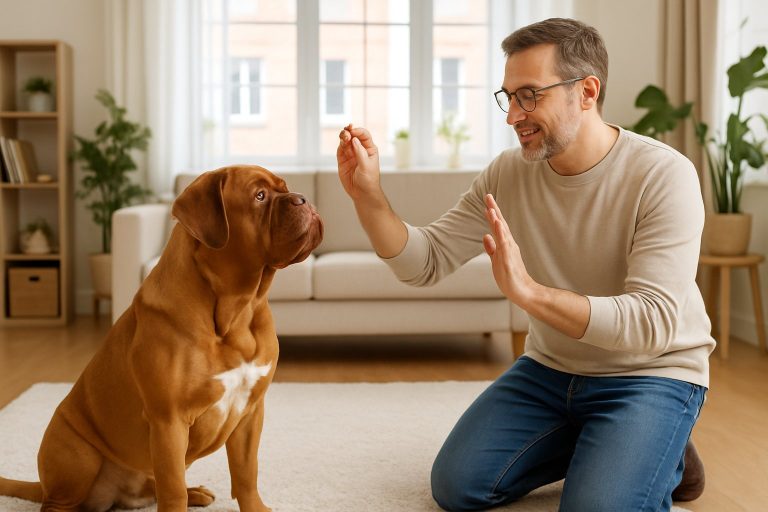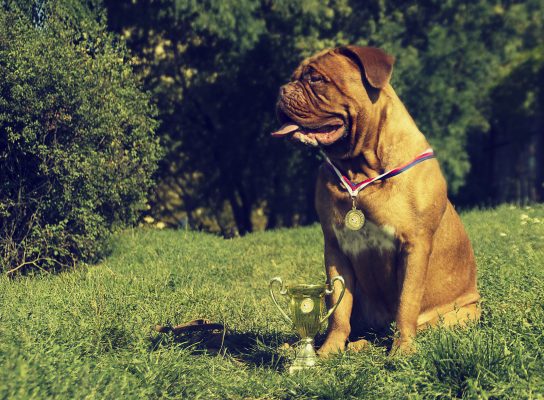Training your Dogue De Bordeaux is an important step to building a calm and respectful relationship with your dog. This breed is strong and loyal but needs guidance to become a happy and well-behaved companion.
Gentle training methods help your Dogue De Bordeaux learn good habits and make living together easier for everyone. With the right approach, you can help your dog reach its full potential as part of your family.
1. Start training at 8 weeks old for best results
- Begin training your Dogue De Bordeaux puppy when they are 8 weeks old. This is the age when they are ready to start learning about their environment and the rules of your home.
- Early training takes advantage of your puppy’s natural curiosity and willingness to learn. During this stage, your puppy is alert and open to new experiences.
- Socialization is also key during this early window. Exposure to different people, places, and pets helps prevent fear and aggression as your Dogue De Bordeaux grows up.
- Focus on basic commands and gentle teaching methods. Keep sessions short and positive, using treats or praise to make training enjoyable for your puppy.
- Starting early builds a foundation for good behavior. The first few weeks can shape your dog’s personality and confidence. For more, see this guide about training Dogue De Bordeaux puppies starting at 8 weeks old.
2. Use positive reinforcement techniques consistently
- You should always use positive reinforcement when training your Dogue de Bordeaux. This breed responds best to calm encouragement and rewards. Harsh or forceful methods can cause fear or stubbornness.
- Offer treats, praise, or favorite toys every time your dog follows a command. This helps your Dogue de Bordeaux understand which behaviors are good. It also builds trust and makes your dog eager to please you.
- Be consistent each day. Use the same cues and reward every correct action. Over time, your dog will learn what you expect.
- If you notice your Dogue de Bordeaux ignoring a command, avoid punishment. Instead, stay patient and repeat the request. Most adults and puppies in this breed learn best through regular, positive feedback and clear communication.
- Positive reinforcement is recommended by trainers as the most effective way to shape good habits in this sensitive and strong dog. Consistency is the key to helping your dog become calm and well-behaved.

3. Establish clear and firm boundaries without harshness
Setting clear boundaries is important when training a Dogue De Bordeaux. This breed is strong and can be stubborn, so you need to use rules that are fair and easy for your dog to understand. Be consistent with the rules you set, and make sure everyone in your home does the same. Use short commands like “no” or “leave it” to create structure without using harsh punishment. Firmly say the command when your dog does something you do not want, but avoid yelling or physical corrections. Clear and calm instruction will help your dog understand what is expected.
4. Build trust through gentle handling and patience
Gaining the trust of your Dogue de Bordeaux is important for successful training. This breed reacts best when you use a calm voice, soft touches, and a relaxed attitude. Rough handling or yelling can cause fear and stubborn behavior. Start handling your dog gently from a young age. Pet, brush, and examine them regularly to create positive experiences with touch. If your dog becomes nervous or hesitant, slow down and give them time to adjust.
5. Avoid heavy-handed discipline to prevent fearfulness
Dogue de Bordeaux dogs are very strong and independent, but they are also sensitive to harsh treatment. Using heavy-handed discipline can create fear and mistrust in your dog, which makes training harder for both of you. Instead of punishment or yelling, use firm but fair boundaries. Stay calm and be consistent with your rules every day. This helps your dog feel safe and understand what you expect.
6. Socialize early with people and other animals
- Start socializing your Dogue de Bordeaux as soon as possible. Early socialization helps your dog grow into a confident and well-behaved companion.
- Expose your puppy to different people, places, and other animals. Aim for calm, positive experiences to build trust and reduce fear in new situations.
- Puppy classes, walks in busy areas, and safe introductions to other dogs are all helpful. This exposure teaches your dog how to act around strangers and other pets.
- Socializing also helps prevent behavioral problems later. Well-socialized Dogue de Bordeaux dogs are less likely to be aggressive or fearful in new environments. For more tips on socializing your dog, visit this training guide for Dogue de Bordeaux.
- Keep each new experience brief and positive. Use treats and praise to reward calm behavior. Over time, your Dogue de Bordeaux will become more relaxed and comfortable in different situations.
- Remember, even adult dogs can benefit from meeting new people and animals. Consistent socialization is an important part of your dog’s training at every stage.
7. Incorporate short, frequent training sessions
- Keep your Dogue De Bordeaux’s training sessions brief and regular. Puppies and even adult dogs in this breed have short attention spans, so long sessions can make them bored or frustrated quickly.
- Aim for training sessions that last around 5 to 10 minutes each time. This length helps your dog stay focused and more likely to remember what you are teaching.
- Frequent, shorter lessons work better than infrequent, long ones. Try to spread out several mini sessions throughout the day to make learning a normal part of daily life.
- Always make training positive and fun. Using treats, praise, and toys will help your Dogue De Bordeaux enjoy the process and look forward to each lesson. Short and enjoyable sessions are shown to be more effective for this breed, as explained in this training guide.
- When you end on a good note, your dog will be excited for next time. This builds good habits and keeps your relationship strong.
8. Reward calm behavior to manage dominance
Rewarding calm behavior is important when training a Dogue de Bordeaux. This breed is large, strong, and can sometimes show dominance. Giving treats or praise when your dog is relaxed helps them understand what you expect. Focus on rewarding your Dogue de Bordeaux when they are quietly sitting or lying down. Calm behaviors should always get your attention, not pushy or demanding ones. Giving a treat or a gentle pat during these moments encourages your dog to stay relaxed.

9. Use consistent commands and body language
- When training your Dogue De Bordeaux, use the same word and hand signal for each command every time. This helps your dog learn faster and reduces confusion. Avoid changing your words or gestures from day to day.
- Clear and consistent commands let your dog know exactly what you expect. For example, always use “sit” for the sitting command instead of switching between “sit” and “down.” Matching your body language with your words makes it even easier for your dog to understand.
- Make sure everyone in your household uses the same cues. This keeps your Dogue De Bordeaux from getting mixed signals from different family members. Consistency helps your dog build confidence and feel secure.
- Dogue De Bordeaux dogs can be stubborn at times, so repetition helps them remember commands. Being consistent with your requests will make the training process smoother and more effective. More tips on basic training can be found in this step-by-step guide.
- Simple and steady signals build trust and set your dog up for success. Giving mixed signals can slow progress or cause confusion, so stick with the same cues every session.
10. Practice leash training to control strength
Leash training is very important for a Dogue De Bordeaux. This breed is powerful and can be difficult to control if not trained early. Teaching your dog to walk calmly on a leash keeps both you and your pet safe. Start leash training when your Dogue De Bordeaux is still a puppy. Use gentle corrections and reward calm behavior. If your dog tries to pull, stop walking and wait until the leash is loose before moving again.




